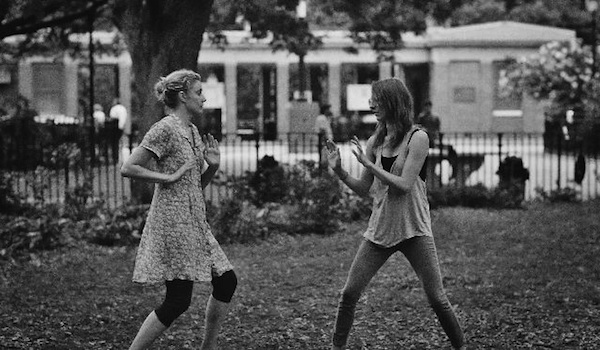Frances Ha Review
Who would have thought the best film from writer/director Noah Baumbach—master of the melancholy—would be so light and airy? Frances Ha is simple, but delightful—a film carried on the back of clever writing and a dynamite lead performance. It also packs a surprising amount of emotion and insight, even if it isn’t the most relatable of films. Fans of HBO’s Girls, of course, will see a lot of Lena Dunham in Greta Gerwig‘s title character, and Adam Driver‘s presence in both only strengthens the bond between the two works of art. Nevertheless, both Frances and Frances Ha are bright lights—unimpeachable bastions of optimism, big dreams, and enduring friendship, with some destructively doe-eyed perseverance thrown in for good measure.
Frances (Gerwig) is a 27-year-old New Yorker who sort of works as an apprentice at a modern dance company. Her best friend and roommate—they’re actually, according to Frances, the same person but with different hair—is Sophie (Mickey Sumner). They struggle together. They smoke together. They plan and plot and commiserate together about their failed relationships. But Sophie decides she’s ready to move out. It’s not Frances, but an apartment has opened up in her dream neighborhood. It’s fine. They’ll see each other all the time. Nothing will change.
At least that’s what they tell each other (and themselves). Slowly but surely, Frances and Sophie drift apart. The former moves in with two male friends, Lev (Driver) and Benji (Michael Zegen), “artists” with rich parents who treat Frances like a sister. Sophie, meanwhile, advances in her publishing career and starts to get quite serious with her boyfriend, Patch (Patrick Heusinger). The two friends see each other on occasion, but they both find themselves lying, consciously or unconsciously, about how things are going in their respective lives. For Frances, it isn’t well. She’s told there’s no room for her in the dance troop’s annual Christmas show, which means falling behind on rent. She’s drinking heavily. It’s bad news, but all seemingly tolerable as long as she stays positive. The further she feels from Sophie, however, the harder it is to be optimistic and keep dreaming.
Though the film goes to some solemn places, it’s never anything less than cheerful. Frances certainly represents “that girl”—the one who’s pretty without trying, who gets by without caring, who’s cultured, and who generally lights up every room she walks into—but only to a degree. She’s an odd duck, who likes to pretend fight with her friends and tends to dance her way down the street, rather than walk or run. She says things like “Ahoy, sexy,” and she sees no problem in basically inviting herself to stay in a stranger’s apartment in Paris. You shake your head when she turns down a job to continue pursuing her dream, yet she’s an immensely likable young woman and easily the year’s most endearing protagonist.
Gerwig’s performance is the best of her career. It isn’t hard to believe considering how strong she was in her last teaming with Baumbach (2010’s Greenberg). She’s also a cowriter, so she must feel quite intimate with the character. She smartly surrounds herself with mostly unknowns who never overshadow her—men and women who feel like they very well might inhabit dingy Brooklyn apartments themselves. The sense of versimilitude, in this respect, is almost palpable.
Baumbach’s direction is typically low-key. His decision to capture Frances Ha on incredibly grainy film stock, however, must be commended. Does it enhance the film in a big way? Perhaps not. Is it nice to see a film on film and in black and white? Hell yes. And because Baumbach and Gerwig are basically blowing kisses to New York City throughout this black and white film, one can’t help but be reminded of Woody Allen’s Manhattan.
Frances Ha has and will continue to be dismissed by some as too irreverent, and yes, the film isn’t exactly serious-minded insofar as it deals with the problems of a girl who could probably try a lot harder. Interestingly enough, the film embraces that attitude, and it somehow does so without judging its lead character. When she tries to tell Benji she can’t afford a housekeeper because she’s poor, he responds by telling her she isn’t actually poor, that poor people would be insulted by the insinuation. “That’s true,” she’s replies after genuinely considering his statement.
But Frances probably is poor, and she’s getting through it. She wants something and doesn’t know enough to recognize when its slipped out of her fingers. The audience knows, which, as I’ve mentioned, tinges everything with a slight melancholy tone, but Frances’ attitude shines through and makes this one of the most pleasant films you’ll likely see this year.
















4 Responses to Frances Ha Review